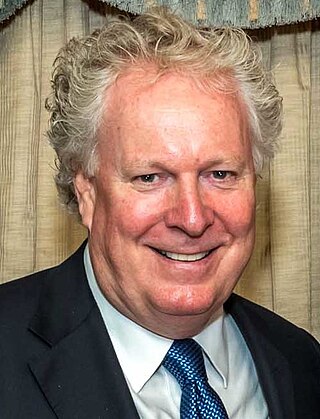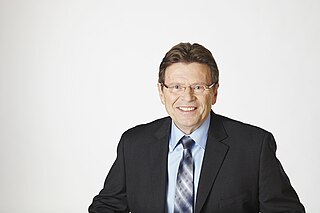Related Research Articles

The Bloc Québécois is a federal political party in Canada devoted to Quebec nationalism and the promotion of Quebec sovereignty. The Bloc was formed by Members of Parliament (MPs) who defected from the federal Progressive Conservative Party and Liberal Party during the collapse of the Meech Lake Accord. Founder Lucien Bouchard had been a cabinet minister in the federal Progressive Conservative government of Brian Mulroney.

The Progressive Conservative Party of Canada was a centre to centre-right federal political party in Canada that existed from 1942 to 2003.

John James "Jean" Charest is a Canadian lawyer and former politician who served as the 29th premier of Quebec from 2003 to 2012. Prior to that, he was a member of Parliament (MP) between 1984 and 1998. After holding several Cabinet posts from 1986 to 1990 and from 1991 to 1993, he was the leader of the Progressive Conservative Party of Canada from 1993 to 1998.

The Reform Party of Canada was a right-wing populist and conservative federal political party in Canada that existed from 1987 to 2000. Reform was founded as a Western Canada-based protest movement that eventually became a populist conservative party, with strong social conservative and fiscal conservative elements. It was initially motivated by profound Western Canadian discontent with the Progressive Conservative Party government of Brian Mulroney.

The 2000 Canadian federal election was held on November 27, 2000, to elect members to the House of Commons of Canada of the 37th Parliament of Canada. Prime Minister Jean Chrétien's Liberal Party won a third majority government.

The 1997 Canadian federal election was held on June 2, 1997, to elect members to the House of Commons of the 36th Parliament of Canada. Prime Minister Jean Chrétien's Liberal Party won a second majority government. The Reform Party replaced the Bloc Québécois as the Official Opposition.

The 1993 Canadian federal election was held on October 25, 1993, to elect members to the House of Commons of the 35th Parliament of Canada. Considered to be a major political realignment, it was one of the most eventful elections in Canada's history. Two new regionalist parties emerged, finishing second and third in seat count. Most notably, the election marked the worst defeat for a governing party at the federal level and among the worst ever suffered by a governing party in the Western democratic world. In a landslide, the Liberal Party, led by Jean Chrétien, won a majority government.

The 2004 Canadian federal election was held on June 28, 2004, to elect members to the House of Commons of Canada of the 38th Parliament of Canada. The Liberal government of Prime Minister Paul Martin lost its majority but was able to continue in office as a minority government after the election. This was the first election contested by the newly amalgamated Conservative Party of Canada, after it was formed by the two right-of-centre parties, the Progressive Conservative Party and the Canadian Alliance.
André Bachand is a Canadian politician, who represented the riding of Richmond—Arthabaska as member of the Progressive Conservatives from 1997 to 2003.
This is a seat by seat list of candidates in the 2004 Canadian election.
André Harvey, PC is a Canadian consultant, politician and former teacher in Quebec, Canada.
Canadian federal elections have provided the following results in the Côte-Nord and Saguenay–Lac-Saint-Jean.
Canadian federal elections have provided the following results in Central Quebec.
Canadian federal elections have provided the following results in the Eastern Townships.

Serge Cardin is a Quebec politician. He was a Parti Québécois member of the National Assembly of Quebec for the Sherbrooke electoral district from 2012 to 2014, and was formerly a Bloc Québécois Member of Parliament for the federal riding of Sherbrooke from 1998 to 2011.
Louis Plamondon is a Canadian politician who served as the interim speaker of the House of Commons of Canada from September 27 to October 3, 2023. A member of the Bloc Québécois, he has represented Bécancour—Nicolet—Saurel since 1984. As the longest-serving current member of the House of Commons, Plamondon is Dean of the House, and holds the record as Canada's longest-serving dean.

The 1998 Progressive Conservative leadership election was held on October 24 and November 14, 1998 to choose a successor to Jean Charest. This was the first time the Progressive Conservatives used a one member, one vote system to choose a leader rather than a delegated leadership convention, which has been the norm since 1927. The 1998 election used a point system that allocated 100 points to each riding, regardless of the number of votes cast in the riding. The candidate who won a majority of points would win the leadership. All party members were eligible to cast a vote. If no candidate received a majority of points on the first ballot, the lowest ranking candidate would be automatically eliminated and a second ballot was to be held using a preferential ballot if more than two candidates remained. The 100-point-per-riding system was again used by the Conservative Party of Canada in their leadership elections.
The 1993 Canadian federal election was held on October 25, 1993, to elect members to the House of Commons of Canada of the 35th Parliament of Canada. The incumbent Progressive Conservative Party of Prime Minister Kim Campbell, in office since June 1993, was defeated by the Liberal Party of Canada under the leadership of Jean Chrétien. The Progressive Conservatives were reduced from 156 to just 2 seats.